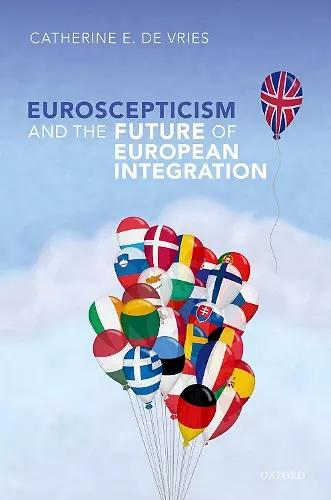Euroscepticism and the Future of European Integration
Format:Hardback
Publisher:Oxford University Press
Published:1st Feb '18
Currently unavailable, and unfortunately no date known when it will be back

The European Union (EU) is facing one of the rockiest periods in its existence. No time in its history has it looked so economically fragile, so unsecure about how to protect its borders, so divided over how to tackle the crisis of legitimacy facing its institutions, and so under assault of Eurosceptic parties. The unprecedented levels of integration in recent decades have led to increased public contestation, yet at the same the EU is more reliant on public support for its continued legitimacy than ever before. This book examines the role of public opinion in the European integration process. It develops a novel theory of public opinion that stresses the deep interconnectedness between people's views about European and national politics, and suggests that public opinion cannot simply be characterized as either Eurosceptic or not, but rather consists of different types. This is important because these types coincide with fundamentally different views about the way the EU should be reformed and which policy priorities should be pursued. These types also have very different consequences for behaviour in elections and referenda. Euroscepticism is such a diverse phenomenon because the Eurozone crisis has exacerbated the structural imbalances within the EU. As the economic and political fates of member states diverged, people's experiences with and evaluations of the EU and national political systems also grew further apart. The heterogeneity in public preferences that this book has uncovered makes a one-size-fits-all approach to addressing Euroscepticism unlikely to be successful.
Professor De Vries' book is [..] a well-timed attempt to examine the nature of Euroscepticism and the role of public opinion which she sees as fundamentally formed by national circumstances. * Derek Hawes, University of Bristol, The Journal of Community Engagement and Scholarship *
There is nothing more important for the sustainable future of Europe than to come to grips with what Euroscepticism is really all about. In her new book, Catherine De Vries has managed the ultimate scholarly feat: to do justice the complex multifaceted nature of the skeptic tribes while at the very same time leaving the reader with a simple message. And the message is this: all is relative! The more one feels confident about one's country ability to cope alone, the more one can afford to diss the EU. * Kalypso Nicolaidis, Professor of International Relations, University of Oxford *
This is an impressive book, and its timing couldn't be better. The question of what fuels Euroscepticism and why it seems to vary across and within countries is central to domestic politics in the EU and to the future of EU itself. In this book, Catherine De Vries develops a creative, original and insightful explanation for how the national context shapes Euroscepticism. The empirical analyses are superb both in characterizing public opinion and in the messy business of untangling what causes what. The findings are sure to provide valuable grist for the mill for politicians, EU officials, and journalist interested in making sense of, addressing, and perhaps even exploiting contemporary public resistance to the EU. * Matthew Gabel, Professor of Political Science, Washington University St Louis *
Catherine De Vries carefully crafts a provocative argument in her book, Euroskepticism and the Future of European Integration. Rejecting conventional mono-dimensional conceptualizations of Euroskepticism, this book makes two fresh claims. First, that Euroskepticism is multidimensional: it can target the European Union as a producer of public goods or as a regime. Second, Euroskepticism is relational: it takes shape in conversation with one's reference pointis there a viable alternative to EU membership? This elegant two-by-two typology is tremendously powerful in illuminating ambivalence about Europe. This is a superbly written, wonderfully perceptive, book, which will move the posts in the field of public opinion. De Vries' analysis brings order to the cacophony of public opinion on Europe. * Liesbet Hooghe, W. R. Kenan Distinguished Professor of Political Science at UNC-Chapel Hill. *
This book is essential reading for anyone interested in the timely issue of Euroscepticism and the challenges facing the European Union. De Vries presents a compelling new theory of Euroscepticsm, arguing that national institutions and policies provide an essential benchmark for citizens' views on the EU. She presents a wealth of empirical evidence supporting her arguments. This book will surely become the new benchmark for any future work on public attitudes towards the EU. * Professor Sara B Hobolt, Sutherland Chair in European Institutions, London School of Economics. *
- Winner of Winner of the 2019 EUSA Best Book in EU Studies Award.
ISBN: 9780198793380
Dimensions: 240mm x 163mm x 23mm
Weight: 566g
270 pages